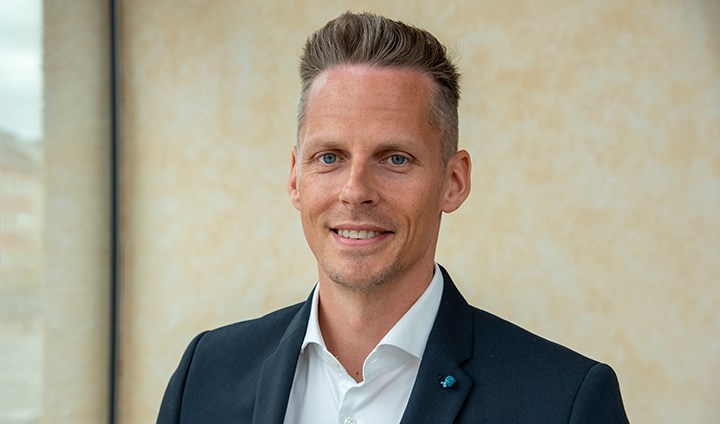“Örebro University values initiative-taking and is open to discussing new ideas.”

Professor Dimitri Beeckman focuses on research development at the School of Health Sciences. As vice head, he is also responsible for internationalisation. He divides his time as a professor between Örebro University and Ghent University in Belgium.
Dimitri Beeckman worked in Australia and England before coming to Örebro University as a visiting professor at the Faculty of Health Sciences. Today, he focuses on establishing skin and wound research in Örebro while dividing his time as a professor between Örebro University and Ghent University in Belgium.
The best thing about working at Örebro University is the openness to creativity and initiative.
How has Örebro University supported you in your career?
“The university values initiative-taking and is open to the discussion of new ideas. Leaders at all levels support and appreciate my joint appointment with Ghent University. This has led to several successes in attracting research funding, collaborative projects, internationalisation partners, and teaching opportunities. We share the importance of open and creative collaboration. And that is the most important thing for me.”
What is it like to work as a professor at Örebro University?
“Örebro University has high-quality research facilities and has the ambition to create even better facilities in the future. But as at any university, the challenge is to fulfil the tasks of an academic, such as research, teaching, leadership tasks and scientific/social services, while still having enough time for one's own research and raising the profile of one's research group. The most interesting thing for me is the possibility of opening new doors for research. Thanks to new interdisciplinary collaborations between my group and artificial intelligence researchers, I am now immersed in the fascinating world of technology and wounds. Such collaborations give me a lot of energy as they can lead to new insights and discoveries. I find the combination of a supportive environment and the independence in which we researchers can develop our research stimulating and enriching.”
What would you say is the best thing about Örebro University?
“The best thing about working at Örebro University is the openness to creativity and initiative. You never have to hesitate to discuss your ideas and proposals. Such a climate encourages the development of ideas and leads people to take responsibility and leadership. As vice head of the School of Health Sciences, I have contacts at all levels of the university, which gives me many opportunities for collaboration and strengthens the ambitions of this young university as well as my own. Importantly, the city of Örebro is also fantastic. One of the main reasons I came to Örebro University was the Swedish culture and way of life. To this day, it has exceeded my expectations. Work and personal life go hand in hand for many. So it was definitely a good fit.”
Do you have any tips for someone thinking about a career in Örebro?
“I have talked a lot about creativity, out-of-the-box thinking and leadership. To me, that’s what Örebro University stands for. Strong academics value openness and thrive in an ever-changing scientific community. The university can benefit from strong individuals who are adept at teamwork and collaboration. If this fits your profile, along with well-developed teaching, research, and networking skills, you should consider applying for a position at Örebro University.”
What are your goals?
“My goal is to lay the foundation for a national and international skin and wound research centre at Örebro University. As technology becomes increasingly important in modern diagnostics, treatment and monitoring, I believe that increased collaboration between clinicians, basic researchers, engineers and policymakers is needed if patient care is to benefit from these advances – and this will become increasingly important for the future. In my leadership role, I will initiate and support sustainable partnerships between the university and industry/business. Finally, I want to contribute to the university’s ambitious vision of being an attractive employer for international academics and high-calibre researchers.”
